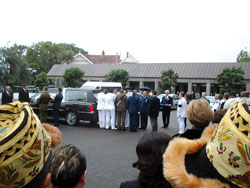|
|
The image of Kami Temba Sherpa removing his traditional embroidered hat and bowing to touch his forehead to Sir Edmund Hillary's flag-draped casket was broadcast from St Mary's Church in Auckland around New Zealand and the world.
Despite the magnitude of the meticulously planned state funeral-the only uncontrollable aspect being the threatening edges of a cyclone, which settled into a gentle, accommodating drizzle-the day's events maintained the understated qualities for which Sir Ed was renowned. The service focused on the things that mattered most in his life: family, friends, his adventures and Nepal.
It is summer in Auckland, and the smooth roads, lined with people paying their final respects as the funeral cort?ge drove by, are a world away from the wintry mountain trails leading up to Sagarmatha. But in Hillary's home, where he lived with his wife, Lady June, there are touches of Nepal everywhere, from the prayer flag and khata-draped photograph of Sir Edmund in the living room to Tibetan carpets on the floors and statues, thankas, books, and photos lining walls and shelves.
Among the gathered mourners, strains of Sherpa and Nepali intermingled with accents from around the world, and the conversation was of Nepal's mountains, places and people: Everest, Ama Dablam, Kanchenjunga, Kathmandu, Khunde, Khumjung, Thame, Tengboche.
Ang Rita Sherpa, manager of the Himalayan Trust and one of four Sherpas in the official government party from Nepal, was one of the speakers at the funeral service. In his eulogy he described Sir Ed as "a man with a big heart, our true guardian and a second father... His loss, for us, is bigger and heavier than Mount Everest." Like countless Sherpas around the world, Ang Rita's life has been shaped by the man he had come to honour, beginning with an education at Khumjung school.
There had been some confusion at the airport when two Ang Rita Sherpas passed through security. The second is the son of the late Mingma Tsering Sherpa, Sir Ed's sirdar and best friend. This Ang Rita laughed as people told him they had seen his mother Ang Doolie Sherpa reminiscing about Hillary in an interview from Kathmandu.
Watching the daily news at the Hillary home was decidedly strange, as faces familiar from the screen later showed up in person at the house to pay their respects. New Zealand Prime Minister Helen Clark was among those offering their condolences.
Beyond the big names and official representatives, there were countless others who flocked to Auckland to pay their respects. Elizabeth Hawley, a long-time friend of Hillary's and a legend in her own right among the mountaineering fraternity, made the long flight from Kathmandu to attend. Norbu Tenzing Norgay, son of Sir Ed\'s climbing partner Tenzing Norgay on the Everest ascent in 1953, was also present and spoke at the funeral of the friendship that had blossomed between his father and the bada sahib. Sir Ed's son Peter was there, with other polar and mountaineering colleagues. Even the four remaining climbers and official journalist from the original 1953 expedition had gathered for a final farewell. Dr Kami Temba, the first Sherpa doctor to be put in charge of Khunde hospital, met a steady stream of former Khunde volunteer doctors and colleagues who had worked there back in the 1970s.
Despite the sadness of the occasion, there was still room for laughter and jokes. As entrepreneur Thukten Sherpa placed a khata on the casket, one close friend commented: "Now that looks more like Ed!"
Everyone had an Ed Hillary connection or story. Phurba Sherpa travelled here from Washington DC. Her late husband, conservationist Mingma Norbu, was among those who died in the Ghunsa helicopter crash in September 2006. Walking slowly behind the Hillary family during the service, her reflections were of the man that her husband had considered a mentor and role model. While here, she worked on arrangements for a scholarship program to bring young Nepali environmentalists to Lincoln University, where Sir Edmund's earlier efforts had sent many a Sherpa-Mingma Norbu and Ang Rita among them-to receive an education that would prove instrumental in conservation efforts in Nepal.
As the conversation ebbed and flowed throughout the day among all these people who had been privileged to know Sir Ed-whether from Nepal, New Zealand, Antarctica or elsewhere-a common thread was the insistence that the most fitting way to honour him would be to ensure that the work to which he had dedicated his life should live on.
Jemima Sherpa was born in Khunde Hospital and is currently at university in Wellington, New Zealand.



